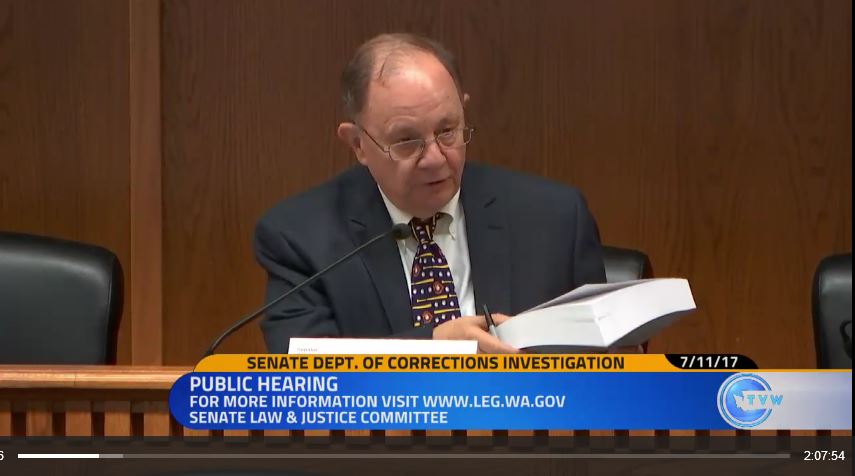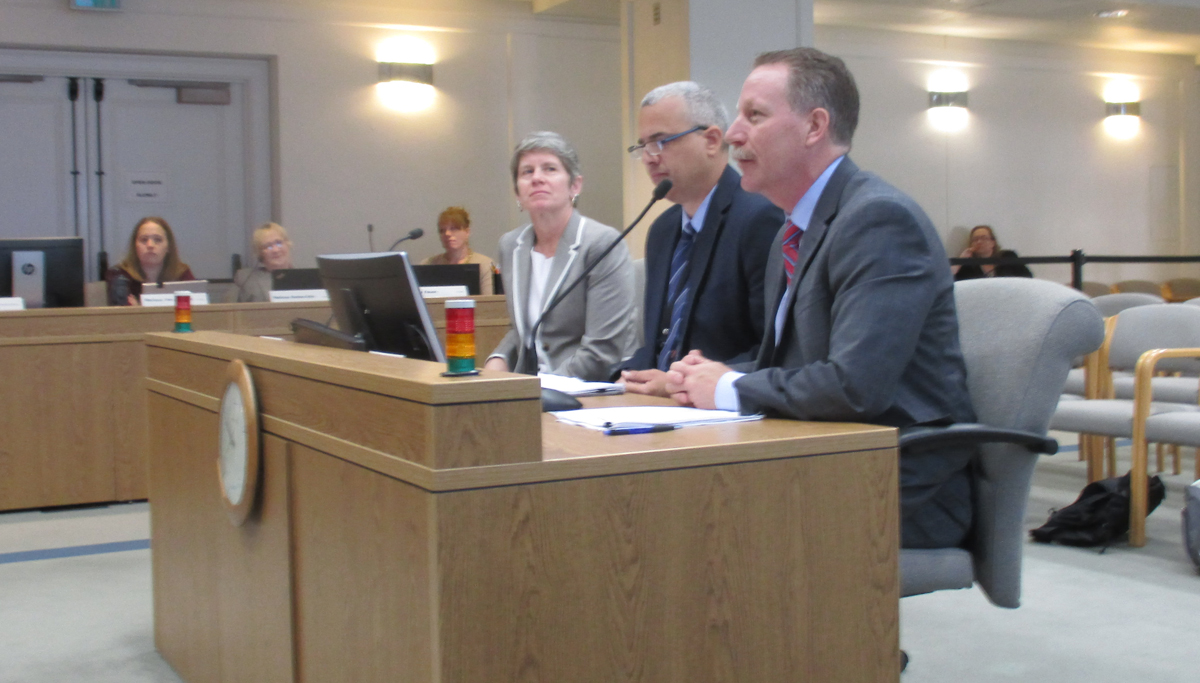The following newsletter was sent to subscribers to Sen. Padden’s Report From Olympia, July 13, 2017. To subscribe to Sen. Padden’s newsletters, click here.

This week’s work session on problems at the Department of Corrections called attention to the fact that we still have not passed a Corrections reform bill, a year after the Senate Law and Justice Committee made recommendations in a thousand-page report. To see opening remarks, click here.
As session nears finish, Hirst fix and Corrections reform hang in balance
Dear friends and neighbors,
Our 2017 legislative session is nearing its finish with two big issues still to be decided. We have yet to reach agreement on a water-rights issue critical for anyone in this state who must draw water from a well. Our Department of Corrections reform bill also hangs in the balance.
But as we enter the seventh month of the longest legislative session in state history, it appears that time is finally running out. We are in the middle of our third overtime session, which ends July 20, and there does not appear to be any willingness to continue past that date. Will the Legislature act on these two important issues? One way or another, we are likely to find out this next week.
We have held up consideration of the state’s $4 billion capital budget in the Senate until there is an agreement on water. Our position is that the Legislature must first overturn the Supreme Court’s misguided Hirst decision, which already is having a devastating effect on property owners around the state.
Meanwhile, we held a work session in the Senate Law and Justice Committee this week to call attention to the work that still must be done to reform the troubled state Department of Corrections. And while we work to wrap up these final issues, a decision by the governor to veto an essential part of the Legislature’s budget agreement has created much frustration. I’ll tell you more in this week’s newsletter.
Sen. Mike Padden
Law and Justice work session puts spotlight on Corrections reform

Stephen Sinclair, right, secretary of the Department of Corrections, testifies at Tuesday’s work session.
This week we held a work session in the Law and Justice Committee to mark the first anniversary of our investigation into mismanagement at the Department of Corrections. Although this agency has made some progress in resolving its internal problems, testimony revealed there is a long way to go.
Our inquiry last year, one of the most exhaustive ever undertaken by the Legislature, was prompted by the early release of some 3,000 violent and dangerous inmates. The problem started when the agency gave incorrect instructions to computer programmers. But it was compounded when the agency learned its computers were calculating sentences improperly, yet delayed a fix for three years while resources were diverted to an ambitious and never-finished computer project. More than a third of the early releases took place after DOC learned of the problem, and many who were released went on to commit new crimes when they should have been behind bars. At least two deaths have been linked to offenders who were released early.
At Tuesday’s work session, we heard from Stephen Sinclair, Gov. Inslee’s appointee to head DOC, who assured us that new governance processes have been established in the agency’s information technology department to ensure that critical software fixes are addressed quickly. “There has come a sense of hypervigilance within the agency,” he said.
This is the minimum we should expect, but it is not enough. Our investigation, as well as one commissioned by the governor, made a series of recommendations aimed at correcting the systemic problems in the agency. Of 12 Senate recommendations, DOC has implemented five. Of the governor’s eight recommendations, six have been implemented.
These are important reforms. They include establishing an independent “ombuds” office to deal with complaints from inmates, families of crime victims and DOC employees. Protections for whistleblowers who dare to challenge agency decision-making. Mandating in state law that DOC’s first duty is the protection of public safety. These changes require the Legislature to act. Though we have worked diligently this session with our colleagues across the aisle to craft a bipartisan bill to address these issues, our effort has caused the governor’s office to bristle. We have learned that an expected House vote on this bill June 30 was blocked when the governor’s staff objected.
This week I called on the governor to declare his support for DOC reform, and to follow through on the promises he made last year to fix the agency. We won’t solve these problems by sweeping them under the rug. Agencies must learn from their mistakes, and the Legislature needs to hold them to it. If we do nothing, future legislatures could find themselves dealing with future crises every bit as tragic as this one.
In the news: Inaction on DOC reform draws attention
Two stories published this week call attention to the governor’s opposition to the Corrections reform bill. The Seattle Times, under the headline, “Bill to improve DOC unlikely to pass; Inslee gets the blame,” quotes Rep. Roger Goodman, D-Kirkland, on the heavy lobbying by the governor’s office that blocked the bill in the House:
“Rep. Roger Goodman, D-Kirkland and chair of the House Public Safety Committee, described the governor’s objections in stronger terms.
“ ‘The governor’s office still strenuously objected to the bill,’ Goodman said.
“Goodman said he was open to allowing SB 5952 — an update to a bill introduced earlier this year — to move forward.”
Meanwhile, the Spokesman-Review noted that the Law and Justice Committee has not yet voted on Sinclair’s confirmation as DOC secretary:
“Confirmation of the new head of the Department of Corrections was stalled Tuesday in a disagreement over independent oversight of the agency between Gov. Jay Inslee and the Spokane Valley Republican who heads a key Senate committee.
“Senate Law and Justice Committee Chairman Mike Padden postponed a recommendation vote on Steve Sinclair, Inslee’s choice for secretary of corrections, after a two-hour review of changes made at the agency in the wake of a major problems in calculating the release dates for inmates.
“Padden said the delay was a way to ‘send a message’ to Inslee about the governor’s opposition to a bill that contains recommendations from a committee investigation into the causes of those early releases.”
Statehouse seethes over Inslee veto
Lawmakers are furious right now with Gov. Jay Inslee for another reason. Last Friday he chose to veto one of the most important elements of the budget compromise reached between the Senate and the House – a 40 percent reduction in business and occupations taxes paid by most Washington manufacturers.
Although I voted against the budget bill because of the compromises it forced on taxation, mandatory paid family leave and other issues, I voted for the manufacturing tax break, which was enacted by a separate bill. The manufacturing tax break was one of the bright spots in the agreement. It aimed to shore up Washington’s ailing manufacturing sector by giving all manufacturers the same low tax rate we now extend to Boeing and other aerospace firms.
By using his line-item veto to strike the B&O tax break, the governor killed one of the key elements of the budget compromise – a provision that was central to Republican support. Many lawmakers are indignant. Though the governor says he wasn’t a party to the agreement and made no promises, his staff was in the room when the budget was negotiated. The veto was a betrayal of the trust that is necessary in the legislative process, and bodes ill for future negotiations involving the governor’s office. Republicans need to be able to trust Democrats, and vice versa.
‘Hirst comes first’ becomes Senate rallying cry
We’re starting to hear complaints from the governor, House leaders and the urban Puget Sound area about the Senate’s decision to defer consideration of the capital budget until an agreement is reached on water. It shows we finally have gotten their attention on one of the biggest issues facing our state this year.
The Supreme Court’s Hirst decision threatens ruin for thousands of families that will not be able to obtain the water they need to develop their land. This is an enormous issue for rural Washington, as well as in suburban areas where connections to city water cannot be made. The court’s decision overturned decades of water law that permitted small household wells with a minimum of bureaucratic red tape. Now property owners must prove their wells won’t harm fish runs, on a case-by-case basis. Hydrological studies are costly, and counties say they lack the ability to evaluate them. Some planning departments have given up, and development in some areas is at a standstill.
The problem is that environmental groups and other interests are urging urban legislators to leave the ruling intact – so that higher costs and bureaucratic requirements can be used to discourage development outside of cities. No water means no development.
We agree that the capital budget is important to the state, and that the governor and the House ought to show some leadership to help break this logjam. We have passed a bill to restore preexisting water law four times in the Senate, but the House has yet to act. This is the holdup. What is repugnant is denying water to families who need it.
Interested in paging next year?
As the 2017 session nears its close, it’s time to begin thinking about next year’s session. The Washington Legislature offers youths ages 14 through 16 the opportunity to spend a week working at the statehouse as a legislative page. This program offers our brightest teenagers a chance to see our Legislature in action. We are always honored to sponsor youths from the 4th District as Senate pages. For information on the program and application forms, click here.
Contact us
If you have a question or concern about state government, please do not hesitate to contact our office. We are here to serve you!
Phone: (509) 921-2460
Street address: 11707 East Sprague Ave., Suite 305, Spokane Valley, WA 99206
Email address: Mike.Padden@leg.wa.gov











